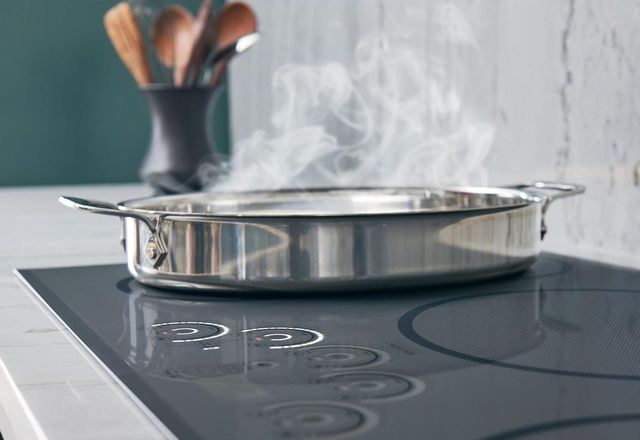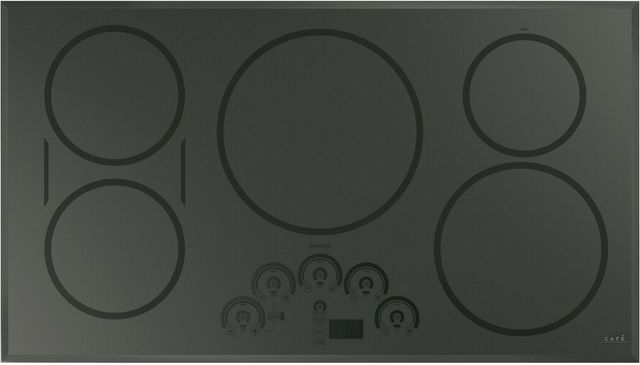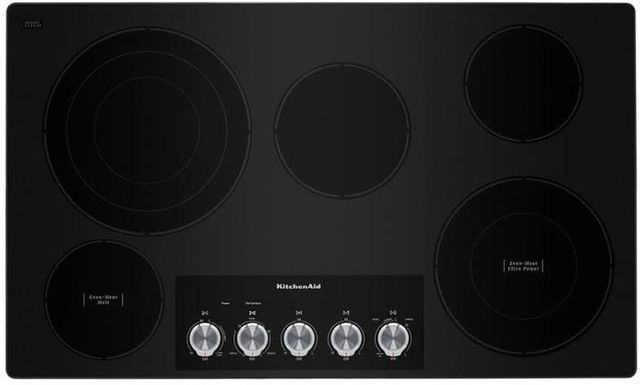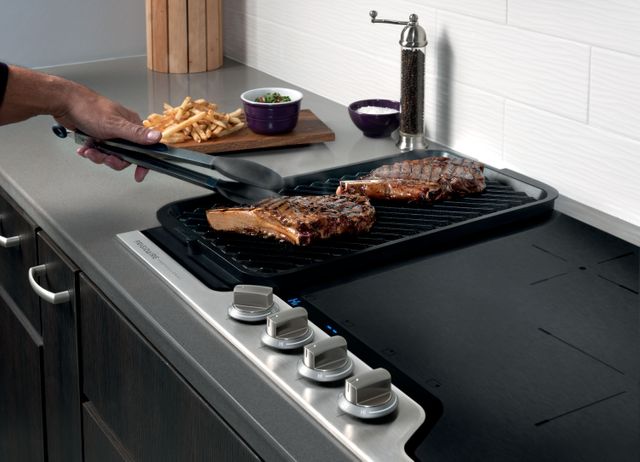It's time for dinner. You've prepared all of the food and have all of the necessary cookware. You only need to wait for the cooktop to heat up. Many people have long regarded gas cooktops as the ideal way to cook, with the promise of quick heating and an even flame. But, for good reason, electric and induction cooktops have caught up in capability and have begun to gain popularity. These alternatives have come a long way since the days of exposed coils, and they are often safer and cleaner than gas cooktops.
If you're remodeling your kitchen, you may have to choose a side on the induction vs electric cooktop discussion. Both are excellent choices, but it's crucial to recognize how they differ and which will work best for the particular meals you tend to prepare the most frequently. In this blog, our experts weigh in on the induction vs electric cooktop debate to help you decide which smooth top cooktop is best for your culinary paradise.
Induction Cooktop Overview

Induction cooktops are becoming more mainstream, especially as their prices fall. Many of the induction’s features make it a popular choice among homeowners. Induction ranges/cooktops, like a smooth top and coil cooking appliances, use electricity as their fuel source. The heating element is hidden beneath the cooktop surface in all induction units. Electromagnetism is the primary distinction between induction cooking and traditional electric heating elements.
How Do Induction Cooktops Work?
Induction cooktops are essentially electric because they do not use gas to generate heat. On the other hand, induction cooktops generate heat via coils beneath the surface. Around 90 percent of induction electric cooktop energy consumption is used for cooking food. There is no energy loss, providing instant heat and temperature control.
Induction heating uses electromagnetic radiation, alternating an electric current as it passes through the ring to the cookware. As a result, the pot or pan begins to heat, and your food begins to cook. An induction cooktop has no residual heat because the air between the cooktop and the pan is never heated.
Shop Induction Cooktops
Shop NowHow Much Do Induction Cooktops Cost?
Induction cooktops typically cost between $1,000 and $2,500, though a high-end cooktop with custom materials and additional features can cost more than $5,000. For foodies looking for a deal, Idler's Home Store has a large cooktop catalog with top brand induction cooktops starting at $500.
Induction Cooktop Pros and Cons
Cooking on an induction cooktop has numerous advantages. The fact that they use far less energy to heat is the most important, but here are some pros and cons people consider in the induction vs electric cooktop debate.
Pros
Instant Temperature Control
Induction, like gas, provides instant temperature control. While induction cooktops use electricity, they are not the same as slow-responding electric coil cooktops or electric smooth top cooktops.
Easy to Clean
It's simple to clean; simply wipe it down with a wet cloth. There are no heavy grates to deal with, as there are on gas cooktops.
Safety
They are the most secure cooktop option. Only the pan heats up, and there are no gas leaks.
Efficiency
Induction cooktops heat water faster than electric or gas cooktops. More than half of the heat produced by gas is wasted and escapes around the pan. Induction is up to 90 percent efficient, resulting in shorter heating and boil times.
Cons
Cookware Compatibility
Most cast iron and stainless-steel pots and pans will work with induction, but if you have aluminum or copper cookware, you may need to replace it all. You're good to go if a magnet sticks to the bottom of the cookware.
Design Fit
The all-black glass has a sleek modern appearance that may not complement farmhouse or more traditional decor.
Noise
A buzz or humming sound may be heard at higher settings.
Magnetic Interference
A digital thermometer can be affected by the magnetic field.
Scratch Risk
The surface is susceptible to scratching, particularly with heavy cast iron.
Best Induction Cooktop
If you weren't sure where to start, here is our top recommendation for induction cooktop inspiration — and if you like it, you can purchase it from one of our California Central Coast locations.
Most Popular: Café™ 36" Flagstone Gray Induction Cooktop

With this induction cooktop, Café gives home cooks everything they need to become the Master Chef of their kitchens. The ceramic glass top in flagstone gray has five induction elements to cook a full course breakfast of pancakes, sausage, bacon, eggs, and grits galore. On days when you don't know what to cook, use the Gourmet Guided Cooking feature, which combines video-guided recipes from top chefs with a system that automatically adapts, adjusting for time, temperature, and your cooking pace for maximum deliciousness.
Electric Cooktop Overview

Electric cooktops have been around for decades, and most people are at ease with them. Electric is typically available in two configurations: a smooth top (usually ceramic glass) with concealed heating elements or a coil heating element on top. They reach your desired temperature more slowly than gas. When turned off, electric heating elements also take some time to cool down.
How Do Electric Cooktops Work?
Electric cooktops, also known as radiant cooktops, provide centralized heat. An electrical current flows through a metal coil beneath an electric cooktop's glass or ceramic surface. Because of the electrical resistance, the coil becomes hot and begins to glow. It will use infrared energy to transfer heat through the glass. This means that the burner with your pot or pan is the one that heats up. The heat transfers between the cooktop and the pot and then cooks your food.
Electric cooktops have residual heat for an undetermined amount of time, which is why these ranges usually have an indicator light indicating that the burner is still warm.
Shop Electric Cooktops
Shop NowHow Much Do Electric Cooktops Cost?
Electric cooktops typically cost between $300 and $1,000, making them the less expensive of the two. If you prefer an electric cooktop, visit one of our Idler's Home locations to browse our large selection of electric cooktops. We have selections priced from $200 for home cooks looking for a bargain to $3,000 for chefs looking to splurge a little.
Electric Cooktop Pros and Cons
Electric cooktops aren't as hip as induction cooktops, but that's alright. These types of cooktops persist in having advantages over induction. Of course, electric cooktops have some downsides. Here are a few pros and cons:
Pros
Simple Installation & Usage
Electric cooktops are both simple to install and use. Because they are the most common, they are frequently what most people know how to use and cook on.
Residual Heat for Simmering
Radiant heat provides some residual heat to keep food warm or to simmer.
Energy Efficient
Electric cooktops offer controlled and managed heat to help reduce energy costs.
Cons
Safety Hazard from Residual Heat
Residual heat can be dangerous, especially in families with children.
Slow Heating
Electric cooktops require more time to heat up, increasing cooking time.
Uneven Heat Distribution
The coils frequently provide uneven heat distribution.
Scratches on Glass Surface
The surface of the glass may scratch — avoid using heavy cookware.
Difficult Cleanup
If food burns on it, cleanup is difficult. Even after you turn off the burners, the surface remains hot. Make sure to clean up any leftover food as soon as possible.
Best Induction Cooktop
If the pros outweigh the cons for the cooktop, take a look at our top electric cooktop recommendation and if you like what you see, stop by to snag it at one of our locations!
Most Popular: KitchenAid® 36" Stainless Steel Electric Cooktop

Shop this KitchenAid Electric Cooktop
If you need a cooktop that isn't too big or too small, this KitchenAid 36-inch electric cooktop will fit perfectly on your island countertop. What it lacks in smart features, it more than makes up for in power. The heating power provided by each of the five heating elements is unique. For example, the 10-inch element has Even-Heat Ultra Power, which offers greater versatility for high and low-temperature cooking methods. In contrast, the triple-ring element (12, 9, and 6 inches) provides greater leeway, allowing you to use cookware of any size. You can control the heat of these five heating elements with precision and accuracy using the stainless steel knobs, and the hot surface indicator lets you know if there is any lingering heat to prevent potentially burn accidents.
Which is Better: Electric vs Induction Cooktop
The decision is entirely up to you when it comes to induction vs. electric cooktops. Everything is determined by your priorities, cooking style, kitchen needs, and budget. If you'd rather use something you're already familiar with, go with an electric cooktop. These models are the best option if you prefer to shop for a more affordable option that does not require specific cookware.
At the same time, if you prioritize energy efficiency, an induction cooktop may be a better fit. They are the best option if you want a cooktop that provides even and fast heating, saves energy, and increases safety due to no heat transfer.
There are still many things to consider when choosing the best cooktop, such as your budget, your kitchen's size, and how much you intend to use it. Ultimately, regardless of which side of the induction vs. electric cooktop debate you are on, Idler's has whatever you are looking for. We have a wide range of cooktops to offer our customers (even if you prefer gas types) at unbeatable prices in the Central Coast that will keep you coming back for all of your appliance needs.
Are you still on the fence when it comes to choosing a side of the induction vs electric cooktop discussion? Here are a few questions we answered from our customer that may help you make a decision.
Electric vs Induction Cooktop FAQ
Induction cooking tops are approximately 5–10 percent more efficient per unit than conventional electric resistance units and approximately three times more efficient than gas. If all cooking tops sold in the United States in 2021 used induction technology and met draft criteria, the energy savings would exceed $125 million and 1,000 GWh (gigawatt).
Electric cooktops are made up of coiled metal elements that sit underneath a ceramic surface and electronically heat the surface to the desired temperature. The heat generated prepares the pan for cooking. Induction cooktops use electromagnets rather than metal coils to heat the pan rather than the surface.
Stainless steel pots and pans are a great choice for induction cooking because they are durable and easy to clean, but the cooking results can be uneven at times. Because not all stainless steel is magnetic, you should conduct the magnet test to be certain.
If you live on the Central Coast, explore electric and induction cooktops from leading brands at Idler's Home, today!
Why Trust Idler's Home?
At Idler's Home, we believe in providing the highest quality products and service to our community. Over the span of 70 years (and counting), our business has seen successful growth, with over 100 employees and with five locations along the central coast of California. Not only do we offer major appliances, quality furniture, and the best mattresses but we also provide hot tubs and swim spas and perform kitchen design services. In addition, our trained professional installers can set up all appliances we sell while our factory-trained technician's service and repair them if they ever break down. Suffice it to say: Idler's is dedicated to help you make the vision you have for your home a reality.
Shop Cooktops at Idler's
Envision the possibilities for your home and shop cooktops online at Idler's. Our friendly team is always happy to help you ultimately decide which one is better for you when it comes to induction vs electric cooktop — whether you call us, email us, or use our online chat feature. Or better yet, stop by any of our five Central Coast locations to experience the quality of our products yourself. Visit us today!
→ Learn more: What Is a Convection Microwave, and Are They Worth It?
